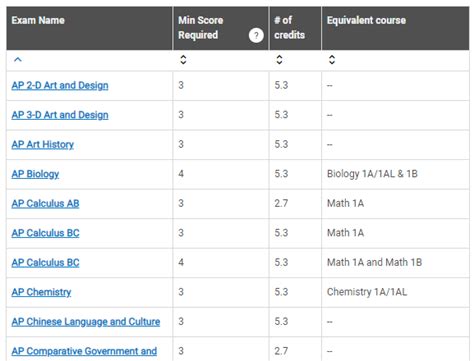Achieving success in higher education often entails strategic planning and optimizing opportunities. Earning Advanced Placement (AP) credits offers a remarkable advantage, empowering students to demonstrate their academic prowess, accelerate their studies, and potentially save thousands of dollars in college expenses. Leveraging UC AP credit is an invaluable strategy for students aspiring to attend the esteemed University of California system or transfer to other institutions.

The Significance of UC AP Credit
According to the College Board, more than 1.4 million students took AP exams in 2021. Among those who scored a 3 or higher, nearly 40% were enrolled in a four-year college the following fall, and almost 20% had earned enough AP credits to bypass entire college courses.
The University of California system recognizes AP exams as a means of demonstrating college-level proficiency in various subjects. Students who earn qualifying AP scores may be eligible for course credit, placement into higher-level courses, or both. This can significantly shorten the time it takes to complete a college degree, allowing students to graduate early, pursue double majors, or pursue other academic interests.
Benefits of UC AP Credit
Earning UC AP credit offers numerous benefits, including:
- Accelerated Degree Completion: By earning AP credit, students can potentially bypass introductory-level courses, allowing them to take more advanced coursework or graduate earlier.
- Cost Savings: AP credits can save students thousands of dollars in college tuition and fees. According to the College Board, the average cost of a college credit in 2022-2023 was $1,720.
- Enhanced Academic Opportunities: With more time and flexibility in their schedules, students can pursue research opportunities, participate in internships, or study abroad.
- Improved College Readiness: The rigorous academic demands of AP courses prepare students for the rigors of college-level coursework.
How to Earn UC AP Credit
To earn UC AP credit, students must take AP exams and achieve qualifying scores. The UC system has established minimum qualifying scores for each AP subject that vary by course and campus. Students can find the specific score requirements for each campus and subject on the UC AP Credit Policy website.
Using UC AP Credit to Transfer
In addition to using AP credit towards a degree at a UC campus, students can also use AP credit to transfer to other colleges and universities. Many colleges and universities accept UC AP credit, but it is essential to check with the specific institution to confirm their acceptance policy.
Students who plan to transfer should work closely with their high school counselors and the transfer admissions office at the college or university they plan to attend to determine how their AP credit will be applied.
Tips and Tricks for Maximizing UC AP Credit
- Start early: Begin preparing for AP exams in your sophomore year by taking rigorous honors or college-preparatory courses.
- Pace yourself: Don’t try to take too many AP exams in one year. Focus on a few subjects that you are confident in.
- Take advantage of resources: Utilize online resources, study guides, and practice tests to prepare for your exams.
- Consider AP summer courses: Some colleges and universities offer AP summer courses that can help students prepare for exams.
- Don’t be afraid to ask for help: If you are struggling with a subject, reach out to your teachers or classmates for assistance.
Common Mistakes to Avoid
- Not preparing enough: One of the biggest mistakes students make is not putting in enough effort to prepare for AP exams.
- Trying to do too much: Don’t try to take too many AP exams in one year. Focus on a few subjects that you are confident in.
- Procrastinating: Don’t wait until the last minute to start studying for your exams.
- Not following the curriculum: Make sure you are familiar with the AP course curriculum and materials.
- Skipping classes: Attending AP classes regularly is essential for success on the exams.
FAQs
1. What is the difference between UC AP credit and transfer credit?
UC AP credit is earned by taking AP exams and achieving qualifying scores. Transfer credit is earned by completing courses at another college or university and having them transferred to your current institution.
2. How do I know if my AP credit will transfer to my desired college or university?
Check with the transfer admissions office at the college or university you plan to attend to confirm their acceptance policy for AP credit.
3. Can I use UC AP credit to replace required courses?
In most cases, UC AP credit can be used to replace required courses. However, some colleges and universities may have specific restrictions on which courses can be replaced by AP credit.
4. How much AP credit can I earn?
The number of AP credits a student can earn varies depending on the number of exams they take and their scores. Students can earn a maximum of 32 UC AP credits.
5. How long is UC AP credit valid?
UC AP credit does not expire. However, some colleges and universities may have a time limit on how long they will accept AP credit.
6. What if I don’t score high enough on an AP exam to earn credit?
If you don’t score high enough on an AP exam to earn credit, you can still use your score to self-place into higher-level courses at your college or university.
7. How can I get help preparing for AP exams?
Students can get help preparing for AP exams by taking AP courses in high school, using online resources, studying with classmates, and hiring a private tutor.
8. What are some tips for success on AP exams?
Some tips for success on AP exams include studying regularly, taking practice exams, and getting a good night’s sleep before the exam.
